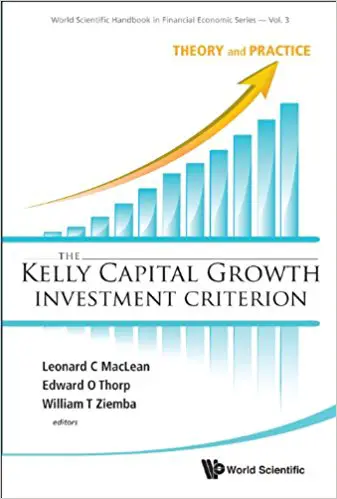We hope you love the books people recommend! Just so you know, The CEO Library may collect a share of sales or other compensation from the links on this page.
This book has 1 recommendation
Nassim Nicholas Taleb (Flaneur)
There are two methods to consider in a risky strategy.
1) The first is to know all parameters about the future and engage in optimized portfolio construction, a lunacy unless one has a god-like knowledge of the future. Let us call it Markowitz-style. In order to implement a full Markowitz- style optimization, one needs to know the entire joint probability distribution of all assets for the entire future, plus the exact utility function for wealth at all future times. And without errors! (I have shown that estimation errors make the system explode.)
2) Kelly's method (or, rather, Kelly-Thorpe), developed around the same period, which requires no joint distribution or utility function. It is very robust. In practice one needs to estimate the ratio of expected profit to worst- case return-- dynamically adjusted to avoid ruin. In the case of barbell transformations, the worst case is guaranteed (leave 80% or so of your money in reserves). And model error is much, much milder under Kelly criterion. So, assuming one has the edge (as a sole central piece of information), engage in a dynamic strategy of variable betting, getting more conservative after losses ("cut your losses") and more aggressive "with the house's money". The entire focus is the avoidance of gambler's ruin.
The first strategy was only embraced by academic financial economists --empty suits without skin in the game -- because you can make an academic career writing BS papers with method 1 much better than with method 2. On the other hand EVERY SURVIVING speculator uses explicitly or implicitly method 2 (evidence: Ray Dalio, Paul Tudor Jones, Renaissance, even Goldman Sachs!) For the first method, think of LTCM and the banking failure.
Let me repeat. Method 2 is much, much, much more scientific in the true sense of the word, that is rigorous and applicable. Method 1 is good for "job market papers" . Now this book presents all the major papers for the second line of thinking. It is almost exhaustive; many great thinkers in Information theory and probability (Ed Thorpe, Leo Breiman, T M Cover, Bill Ziemba) are represented... even the original paper by Bernouilli.
Buy 2 copies, just in case you lose one. This book has more meat than any other book in decision theory, economics, finance, etc...
Amazon description
This volume provides the definitive treatment of fortune's formula or the Kelly capital growth criterion as it is often called. The strategy is to maximize long run wealth of the investor by maximizing the period by period expected utility of wealth with a logarithmic utility function. Mathematical theorems show that only the log utility function maximizes asymptotic long run wealth and minimizes the expected time to arbitrary large goals. In general, the strategy is risky in the short term but as the number of bets increase, the Kelly bettor's wealth tends to be much larger than those with essentially different strategies. So most of the time, the Kelly bettor will have much more wealth than these other bettors but the Kelly strategy can lead to considerable losses a small percent of the time.
There are ways to reduce this risk at the cost of lower expected final wealth using fractional Kelly strategies that blend the Kelly suggested wager with cash. The various classic reprinted papers and the new ones written specifically for this volume cover various aspects of the theory and practice of dynamic investing. Good and bad properties are discussed, as are fixed-mix and volatility induced growth strategies. The relationships with utility theory and the use of these ideas by great investors are featured.
Get this book on Amazon | Barnes & Noble | Book Depository | iBooks
See more books recommended by
See more books written by
Leonard C. MacLean, Edward O. Thorp , William T. Ziemba




